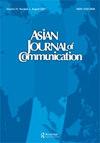Doxing, regulation, and privacy protection: expanding the behavioral consequences of the third-person effect
IF 1.5
2区 文学
Q2 COMMUNICATION
引用次数: 0
Abstract
ABSTRACT This study investigates the third-person effect in relation to the internet-related practice of doxing. A national phone survey with a representative sample of adult citizens (N = 486) was conducted in Taiwan. The respondents reported that they were exposed to mediated messages about doxing through social media or news media. They tended to find others more vulnerable to the influence of media than themselves. The self-other discrepancy of perceived media influence was found to be associated with support for regulating doxing and intentions to engage in doxing. Perceived media influence on others was also found to motivate people to protect their privacy. The findings inform public opinion about doxing and expand the range of behavioral consequences that perceived media influence might induce.Doxing、监管与隐私保护:第三人效应的行为后果拓展
摘要本研究调查了第三人称效应与网络相关的doxing实践的关系。一项以成年公民为代表的全国性电话调查(N = 486)在台湾进行。受访者报告称,他们通过社交媒体或新闻媒体接触到了关于dosing的中介信息。他们往往发现他人比自己更容易受到媒体的影响。人们发现,感知媒体影响力的自我-他人差异与对监管doxing的支持和参与doxing的意图有关。人们还发现,媒体对他人的影响会激励人们保护自己的隐私。这些发现为公众舆论提供了关于dosing的信息,并扩大了感知到的媒体影响可能引发的行为后果的范围。
本文章由计算机程序翻译,如有差异,请以英文原文为准。
求助全文
约1分钟内获得全文
求助全文
来源期刊

Asian Journal of Communication
COMMUNICATION-
CiteScore
3.70
自引率
0.00%
发文量
38
期刊介绍:
Launched in 1990, Asian Journal of Communication (AJC) is a refereed international publication that provides a venue for high-quality communication scholarship with an Asian focus and perspectives from the region. We aim to highlight research on the systems and processes of communication in the Asia-Pacific region and among Asian communities around the world to a wide international audience. It publishes articles that report empirical studies, develop communication theory, and enhance research methodology. AJC is accepted by and listed in the Social Science Citation Index (SSCI) published by Clarivate Analytics. The journal is housed editorially at the Wee Kim Wee School of Communication and Information at Nanyang Technological University in Singapore, jointly with the Asian Media Information and Communication Centre (AMIC).
 求助内容:
求助内容: 应助结果提醒方式:
应助结果提醒方式:


